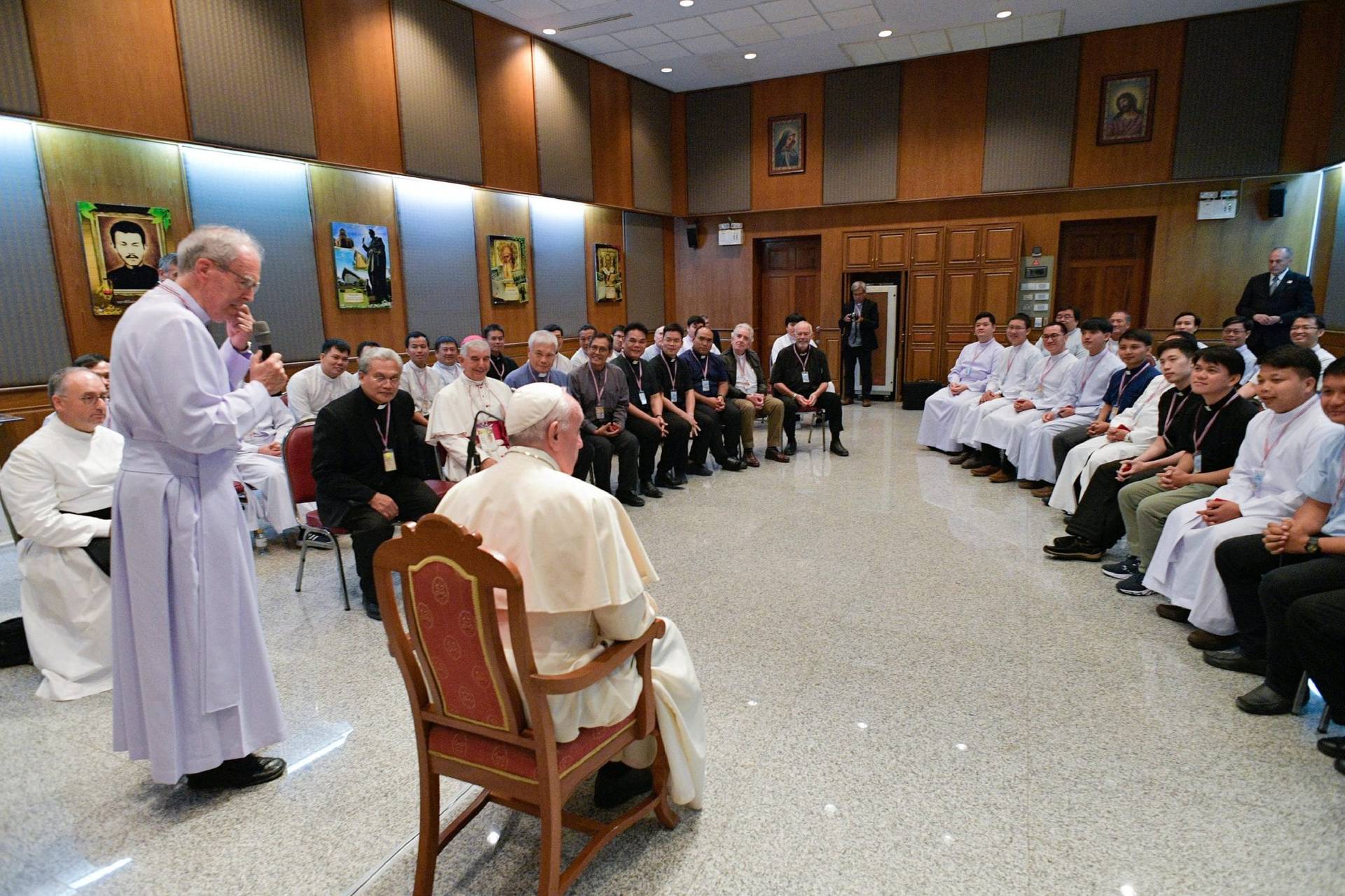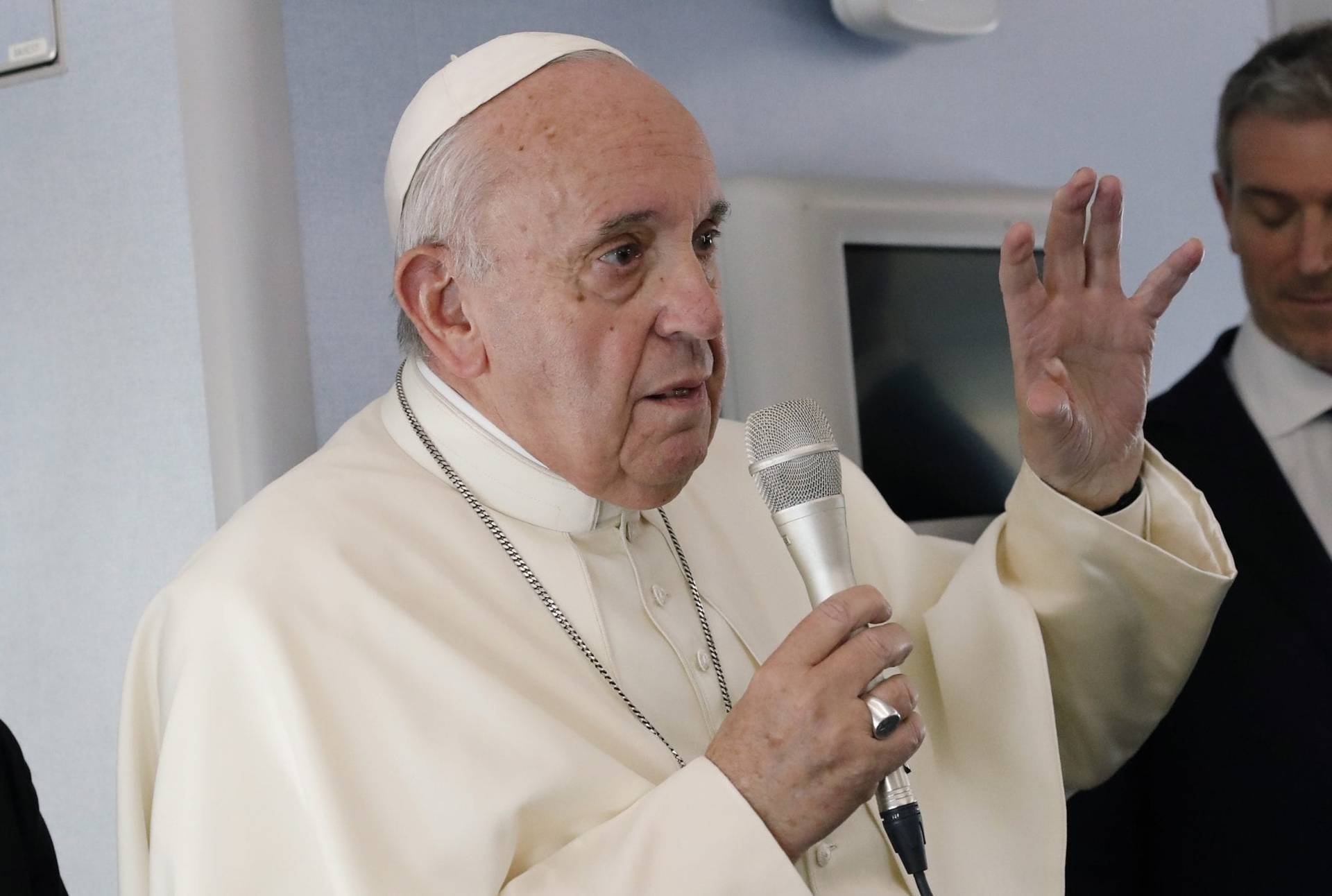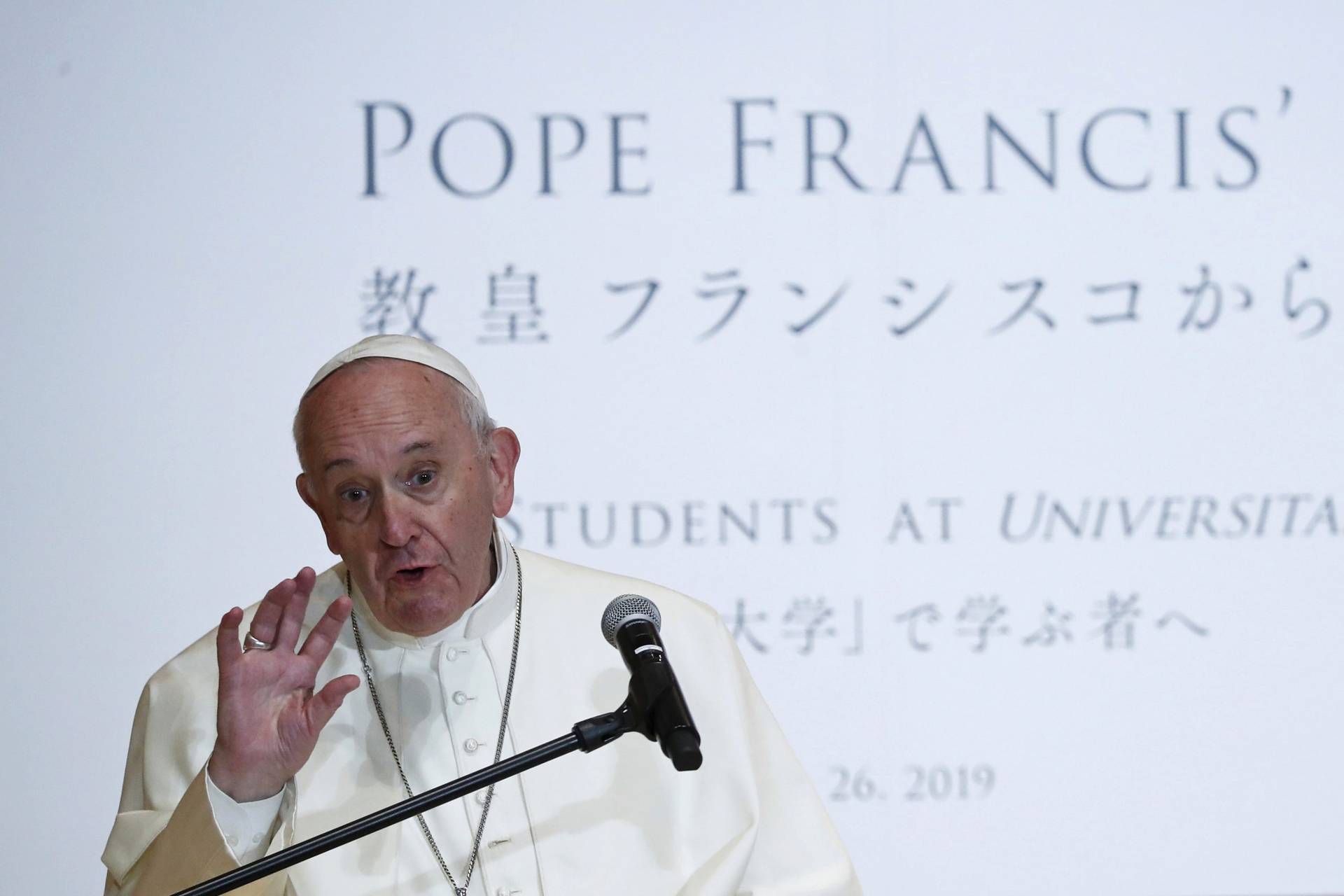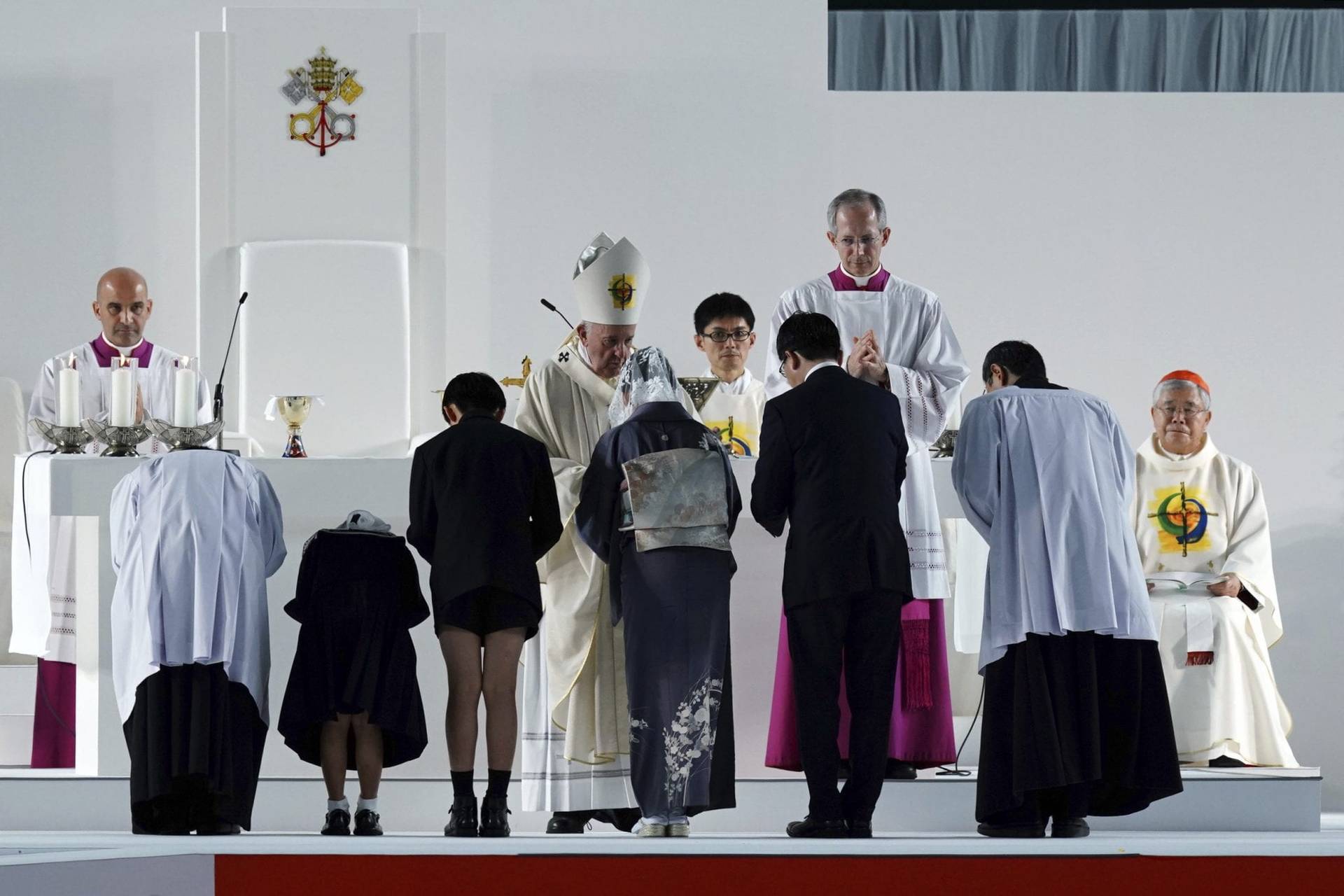BANGKOK, Thailand— In a country where Catholic priests and religious amount to fewer than 2,500 amid 69 million people, Pope Francis urged them not to fear being few in number and to further inculturate the Gospel so Catholicism isn’t seen as a religion for foreigners.
Speaking on Friday in St. Peter’s Parish of Wat Roman in Tha Kham to religious men and women who minister to the country’s tiny Catholic population of less than 400,000, Francis urged them to allow others to see the beauty of “the gaze [of Christ] that captivates because it is able to penetrate appearances to find and celebrate the authentic beauty present in every person.”
“It is a gaze that, as the Gospel teaches us, shatters all determinism, fatalism and standards,” Francis said, noting that, as the Gospels describe, where many saw a sinner, a blasphemer, a tax collector, an evildoer or even a traitor, “Jesus was able to see apostles.”
Through his gaze, and that of his mother, Mary, men and women called to apostolic fruitfulness see in those who are in the margins of society a “brother or sister redeemed by Jesus Christ.”
Christianity, he said, cannot be understood apart from the dignity of each human person. Priests and religious who spend their lives serving Jesus in their brothers and sisters, the pope said, “manage to see beauty where others only see contempt, abandonment or an object of sexual gratification.”
The St. Peter’s Parish is on the outskirts of Bangkok, in a small Catholic neighborhood. Among the hundreds in attendance, was a group of cloistered nuns, seated to the side of the altar, in their brown and black habits. When Francis arrived dozens of children and teenagers welcomed him changing “viva il papa,” an Italian papal hurrah.
RELATED: Pope Francis attacks exploitation of women, children as he begins Thailand trip
There are currently just 835 priests between diocesan and religious in Thailand, no permanent deacons and 1,461 religious, but a boost may be coming: There are over 700 men in the minor seminary and 300 in the major seminary.
In percentage terms, the country is actually priest-rich. There’s one priest for every 500 baptized Catholics, while it’s one per 2,000 in the U.S.
The Catholic Church first arrived in the former kingdom of Sion 350 years ago, with the anniversary falling this year.
“The Lord did not call us and send us forth into the world to impose obligations on people, or lay heavier burdens than those they already have, which are many, but rather to share joy, a beautiful, new and surprising horizon,” Francis said on Friday, before quoting Pope emeritus Benedict XVI, who said that the Catholic Church doesn’t grow by proselytizing but by attraction.
This means that ministers shouldn’t be afraid to look for “new symbols and images, for that particular music which can help awaken in the Thai people the amazement that the Lord wants to give us,” Francis said.
Here, he urged them not to be afraid to continue inculturating the Gospel, looking for new ways of transmitting the faith capable of awakening a desire to know Christ: “Who is that man? Who are these people who follow a man who was crucified?”
Francis also noted that while he prepared for the encounter, he learned “with some pain” that for many here Christianity is a religion for foreigners, in a country where the great majority is Buddhist.
This attitude, Francis said, should spur the Church into finding ways to talk about the faith “in dialect,” much like a mother who sings a song to her child.
“With that same intimacy, let us give the faith a Thai face and flesh, which involves much more than making translations,” he said. “It’s about letting the Gospel be stripped of fine but foreign garb; to let it ‘sing’ with the native music of this land and inspire the hearts of our brothers and sisters with the same beauty that set our own hearts on fire.”
A French missionary living in Thailand told Crux on Thursday that this inculturation often poses challenges. He cited as an example that recently, authorities asked the Church to consider using a different Thai word to refer to a “bishop,” since the current term is the same as a Buddhist leader.
Instead of coming up with a new word in the local language, the Church decided simply to use the English term.
The missionary said he understood the reasoning, since the Thai language is full of words borrowed from English, such as “passport,” instead of the local one, which translates to something like “personal document used to travel abroad.”
Apostolic fruitfulness “requires and is sustained by fidelity to deep prayer,” Francis said, in the manner of grandparents who do their chores with a rosary in hand, “sanctifying their entire day.”
“This is contemplation in action, making God part of the little things of each day,” he said, quoting St. Pope Paul VI, who said that one of the biggest obstacles to evangelization is a lack of fervor, nurtured by a double encounter with the face of Christ and that of “our brothers and sisters.”
Francis began his remarks by thanking all those consecrated men and women who, “by the silent martyrdom of fidelity and daily commitment, have borne great fruit,” including those who were called to struggle for the things that God loves and for which Christ gave his life.
“I would even ask you to be wounded by that same love; to have that same passion for Jesus and for his kingdom,” he said.
Later Friday, Pope Francis met the bishops of Thailand and members of Asia’s bishops conference in the Blessed Nicholas Boonkerd Kitbamrung Shrine, next to the parish of St. Peter where he encountered the religious.
The figure to whom the church is dedicated, in Francis’s words, devoted his life to evangelization and catechesis, primarily here in Thailand but also in part of Vietnam and along the border with Laos, and “crowned his witness to Christ with martyrdom.”
Thousands of faithful were on the premises of the shrine that the pontiff swung through in the popemobile before Friday’s first meeting. Among them were pilgrims hailing from many parts of Thailand and also abroad, including Catholics from China.
Many in the crowd were holding signs in English and Italian, including one that read, “You really know how to pope, alleluia.”
Francis was constantly flanked by his interpreter, Sister Ana Rosa Sivori, his second cousin, an Argentine nun who has been in Thailand since the 1960s.
The pope’s remarks to the bishops were focused on mission, reminding them the Holy Spirit arrives in new territories before missionaries and stays with them. The first missionaries of Asia – many of whom were Jesuits, like the pope, and many of whom were martyred – didn’t look for “guaranteed success,” he said.
“On the contrary, their ‘guarantee’ lay in the certainty that no person or culture was a priori incapable of receiving the seed of life, happiness, and above all friendship that the Lord wants to sow in them,” he said, noting they plunged into these new realities convinced of the beauty “of which they were bearers,” because “all life has value in the eyes of the Master.”
Quoting Pope Paul VI, Francis said “the Church is an evangelizer, but she begins by being evangelized herself. She is the community of believers, the community of hope lived and communicated, the community of brotherly love, and she needs to listen unceasingly to what she must believe, to her reasons for hoping, to the new commandment of love.”
The pope praised the bishops for taking the concerns of their people upon themselves, from the drugs, human trafficking and migrants and refugees to the exploitation of workers and inequality.
Francis said they are doing so on a “multicultural and multi-religious continent,” endowed with great beauty and prosperity but also “troubled” by poverty and exploitation.
“Rapid technological advancements can open up immense possibilities that make life easier, but can also result in the growth of consumerism and materialism, especially among young people,” he said.
Facing these tensions, Francis said, stands the pastor who “struggles and intercedes with his people and for his people,” encouraged by the memory of the first missionaries.
Missionary efforts, he said, cannot depend on “fruitless discussions and ways of thinking that end up making us turn in on ourselves, paralyzing any kind of action.”
As he has done before, the pope urged the bishops not to forget that there are ecclesial structures and ways of thinking that “hamper” the efforts to evangelize, and that no matter how good those structures are, they must be rooted in “an authentic evangelical spirit,” including “fervent prayer and intercession.”
Francis called on the universal Church to learn from bishops and other ministers in Asia, who, as a minority in most of these countries, in many of which “you are persecuted,” haven’t let themselves be corrupted by an inferiority complex nor the complaint that they are not given due recognition.
In the afternoon, the pope is scheduled to take part in an interreligious meeting in this Buddhist-majority country, and later on, say Mass in Bangkok’s cathedral for the country’s youth. He will be in Thailand until Saturday, when he flies to Japan. There he will visit Hiroshima and Nagasaki, where he is expected to release a message on nuclear weapons.
Follow Inés San Martín on Twitter: @inesanma
Crux is dedicated to smart, wired and independent reporting on the Vatican and worldwide Catholic Church. That kind of reporting doesn’t come cheap, and we need your support. You can help Crux by giving a small amount monthly, or with a onetime gift. Please remember, Crux is a for-profit organization, so contributions are not tax-deductible.















